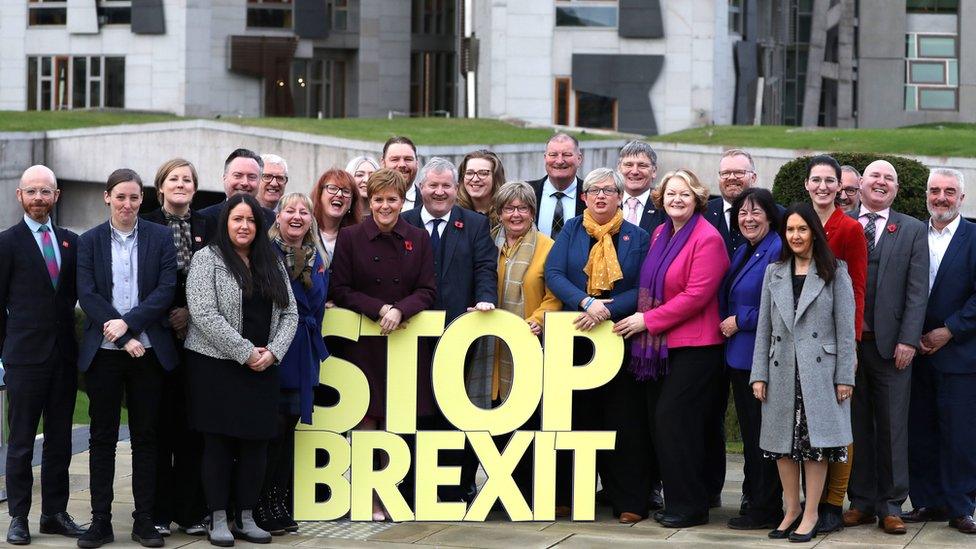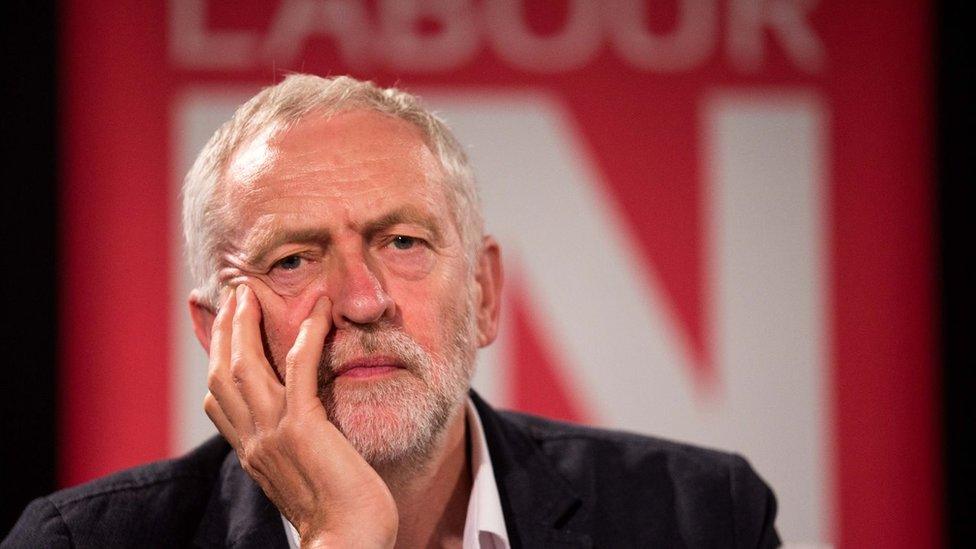SNP launch: Scotland's remain party?
- Published

Scottish National Party candidates and party leader Nicola Sturgeon at the party's general election campaign launch in Edinburgh
Down the decades, the SNP has deployed sundry formulae to stress their promotion of Scottish interests. One thinks, in particular, of the campaign arguing that the black gold in the North Sea was "Scotland's oil".
Today, at the party's election launch in Edinburgh, Nicola Sturgeon essayed a new version. The SNP, she said, was "Scotland's Remain party".
Now, self-evidently, this is primarily a method of addressing Brexit - the core, defining issue of this entire contest. A way, further, of positing the SNP firmly on the side of retaining membership of the European Union.
But there is a second, equally expected, element. Which is to place Brexit in the context of the SNP's primary aim. Scottish independence.
It can sometimes be difficult for the SNP to get a dog in the race when the contest is for Westminster. By dint of simple arithmetic, they cannot hope to form the UK government. That has, sometimes, left them open to a charge of irrelevance when it is a UK election.
Mostly, they counter this rather successfully by offering to provide a voice for Scottish concerns in the Palace by the Thames. But, this time, they have a precise syllogism which has simultaneously afforded them salience and attracted critical attack from rivals.
The syllogism is this. Brexit is a Bad Thing. Brexit is the creature of a broken Westminster system. It cannot be reformed; Scotland must leave Westminster through the door marked independence. Thus, will an independent Scotland be able to reverse Brexit.
Hence Scotland's Remain party. At the launch today, there was an evident enthusiasm among the SNP ranks, including among candidates who were eagerly swapping stories of individual doorstep encounters in their patch, along with canvass returns.
Now, again evidently, there will be those who will challenge Ms Sturgeon's analysis. However, let us confine ourselves for now to conundrums which arise directly from the deliberate conjunction of the Brexit argument and independence.
Balance of power
It strikes me the SNP has two particular challenges in that regard. Firstly, there will be supporters of independence - and thus potential SNP voters - who also opted to leave the European Union.
Secondly, there will be Remain voters who are tempted by the SNP's stance on the EU - but are inimical in principle to independence.
Party strategists concede these two challenges arise - just as they acknowledge that the party was ahead of the curve in 2017 in seeking to build an independence case on the Brexit vote, at that stage.
Now, though, they are adamant that they can find ways round both conundrums. Not completely, but partially and in a fashion sufficient to bring success beyond the 2017 outcome.
First the independence-minded Leavers. The tactic here is to appeal to their fundamental backing for independence, hoping that exerts a stronger pull than their opposition to the EU.
The other group may be more tricky still. There are some who are so hostile to independence that it will deter them from voting SNP, regardless of the party's EU stance.
But others may be persuaded that the SNP will be firm advocates for Remain - and, crucially, may win or retain more Commons seats than the Liberal Democrats. Others still may be so scunnered by Westminster's handling of Brexit that they are more open than in the past to the option of Scottish independence, or at least to contemplating a further choice through indyref2.
And both groupings - independence-minded Leavers and independence-sceptical Remainers - will get a core argument from the SNP. That of "agency". The argument that an independent Scotland could exert influence within the EU comparable to that pursued by countries like Ireland and Denmark. Creating, perhaps, a different EU.
What then, if this combination of arguments works? What if the SNP gain seats and find themselves in the position of holding the balance of power in a hung Parliament?
Nicola Sturgeon was asked if she would contemplate a deal with Boris Johnson, if promised indyref2. Her answer was: "No." The aim was to eject Mr Johnson from Downing Street.
That position is, of course, in line with the SNP's long-standing antipathy to the Conservative and Unionist Party.
There are practical causes too. The Tories also deliver a flat No, when asked if they would contemplate indyref2. Further, an SNP which coalesced with the Conservatives, whatever the prize, might then find added difficulty in persuading Scots to opt for independence.

Nicola Sturgeon has not ruled out a deal with Jeremy Corbyn
Jeremy Corbyn, then? Here, Ms Sturgeon has an alternative difficulty. When asked about the Labour leader, her attitude veers between contumely and dismissal.
She does not rate him. Indeed, with an ironic grin, she noted that, were she asked to choose the leaders of the three main UK parties, none of the present incumbents would pass the test.
But still she does not rule out a deal with Jeremy Corbyn, or Labour, in the event of a hung Parliament. She has a shopping list which seems to grow by the day - from anti-austerity economics through the enhanced devolution of benefits through action on climate change.
But top of that list is a further referendum on independence. Might Mr Corbyn be persuaded to adopt that?
Like Bing Crosby, trilling about the Merry Go Run Around, he won't say no and he won't say yes. It isn't a priority, we are told. No deal, no pact. Labour would govern as a minority and challenge others to cast their votes on individual issues.
But then successive members of Team Corbyn cloud the issue once more by hinting it might arise a bit down the road.
Would Ms Sturgeon be willing to wait? Perhaps - although she insisted at the launch that the timetable should be determined by the Scottish Parliament, not at Westminster.
This potential accommodation, of course, does not operate in a vacuum. Particularly in Scotland, each of the other parties is advancing a case with regard to these twin issues of Brexit and independence.
The Scottish Greens, who had their campaign launch today, back independence and oppose Brexit. But they also want this election to be firmly about climate change and the environment.
Jo Swinson has been campaigning for the Liberal Democrats in Fife North East this afternoon. The Lib Dems claim that the SNP commitment to the EU is only skin deep, that their true interest is independence.
This claim - contested by the SNP - is designed to prise that Nationalist syllogism apart, to detach opposition to Brexit from support for independence.
The Scottish Tories take a different tack, while also responding to the SNP position. They ask voters with pro-Union sympathise to corral around the Tories. In short, they seek a role as the principal Unionist opponent of the SNP and Nationalism.
In particular, the Tories seize on those occasional comments from Team Corbyn to suggest that Labour cannot be trusted to thwart indyref2.
All of which, of course, is deeply frustrating for Scottish Labour leader Richard Leonard. In vain does he struggle against two internal contradictions.
Firstly, he wants to advocate remaining in the EU. But Jeremy Corbyn, while committed to a second Brexit referendum, will not commit to Remain. In fact, to the contrary, he talks about negotiating a "sensible" alternative Brexit package which would indicate the direction of his thoughts.
Secondly, Mr Leonard needs to project a clear verdict on independence. His colleague Lesley Laird today denied that the party had conceded anything on the issue.
Snag again, as noted above, is that that does not quite square with those occasional comments from Team Corbyn. Comments which also perhaps suggest that Mr Corbyn feels he may need support from the SNP, while both parties rule out a formal deal.
All of which puts the Scottish Question front and centre in this UK contest. Alongside, of course, Brexit.
